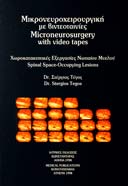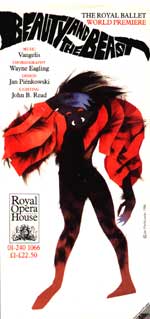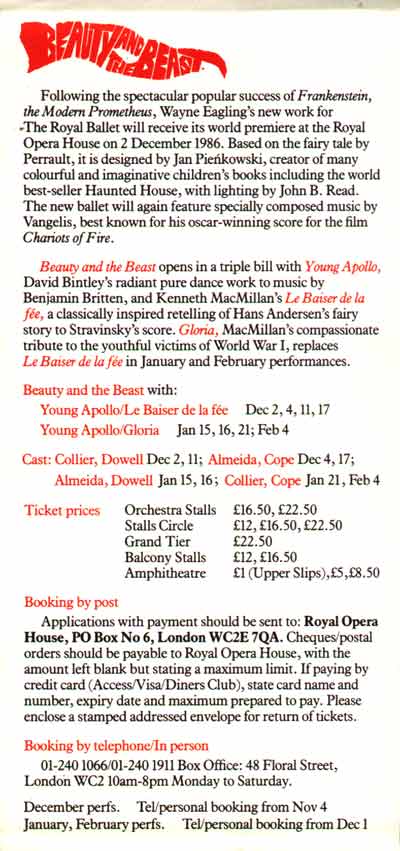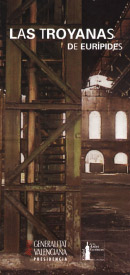A list of musical works by Vangelis that are not obtainable on any audio-media in a legal way. Some of the added descriptions reflect the personal opinion of the maker of this site. Please bear in mind that all tastes are different, and consider any opinion stated here in the usual "IMHO" context.
Film scores
-
Trashed (2012)
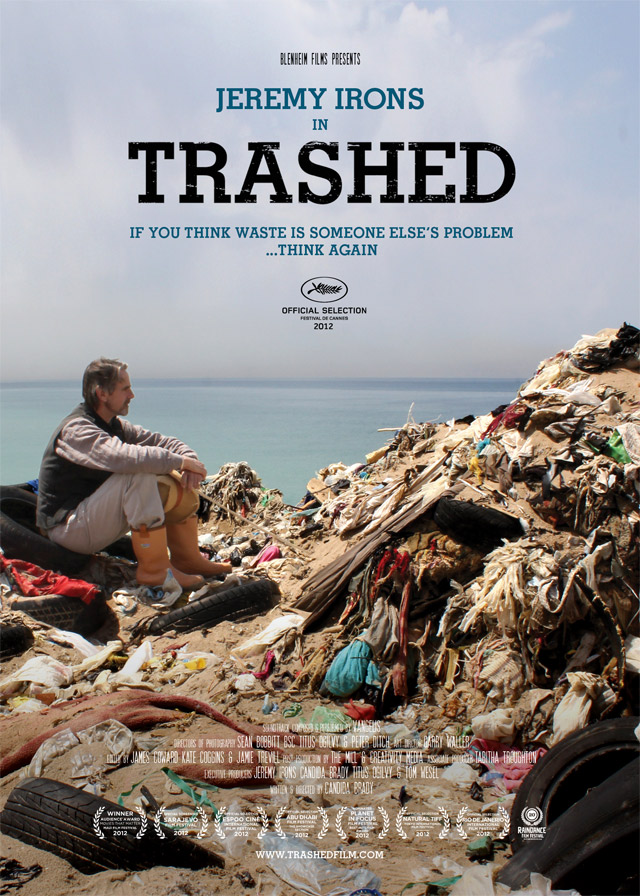
Candida Brady's new environmental documentary is currently circulating film festivals all over the world and will then hit cinemas in New York and Los Angeles. Hopefully this will still be picked up for a general theatrical release, as the film seems to deserve. Word on Vangelis' new score so far is excellent. The opening and closing titles were played by a classical radio station located in Abu Dhabi. There is as of yet no sign of a soundtrack release for this score.
Jeremy Irons stars in this feature film about the world's ever growing waste problems.
-
Rupture (2011)
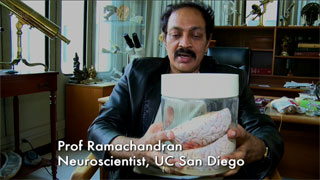
Hugh Hudson's documentary film "Rupture - My Life with my Broken Brain" is a small and intimate project centering around Hudson's wife Maryam D'Abo's recovery from a near fatal brain hemorrhage.
Vangelis composed new music for the movie, which stays in the background. The music's low profile is appropriate for both the intimate nature of the movie and the small size of the project.
In addition to the original music Vangelis recorded a new version of "La Petite Fille De La Mer". Short excerpts from previously released material were also used in the film, such as "Dawn"(The City), "Prelude"(Voices), and music from "La Fete Sauvage".
-
Kavafis (aka "Cavafy") (1996)
A low budget Greek film about the Greek poet Cavafy, directed by Yannis Smaragdis. Vangelis wrote quite a lot of music for this film. It runs for an hour and 17 minutes and there is music present in most scenes. The style of music varies. It often has a Greek flourishes, but it is also reminiscent of comparable scores for films like Francesco, the Plague and Bitter moon. Funny is a scene where people are performing a waltz in a ballroom. By the sound it is instantly recognizable that Vangelis also recorded this waltzing piece.
The film starts with Kavafis at his sickbed and continues looking back at his life, mainly focusing on his homosexual nature and the problems this brought to him.
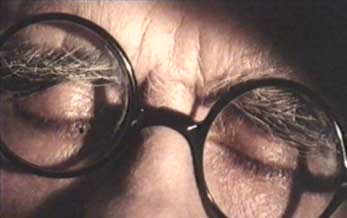
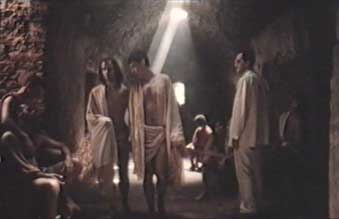
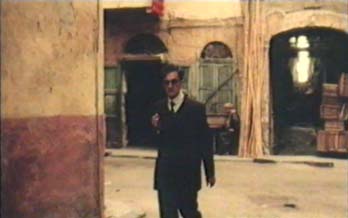
The film got quite a lot of publicity in Greece, given a big impulse by having a score by Vangelis. But it was poorly distributed outside of its home country, appearing only at a selection of film festivals. The film was released on rental video in Greece, with full stereo (Dolby Surround encoded) hifi sound.
Vangelis, to whom the film was also dedicated, wrote about it in the film's promotional flyers:
"The gift of creative geniuses, depending on their means of expression is that they always understand us even when we don't understand them. This is true of Cavafy, who has the gift of understanding us through his poems. It is this incredible Greek that Iannis Smaragdis wanted to honor with this respect, and not to interpret him. This is not a film biography of the poet, but a taste of moments that are enough to make us feel the rest inside us. The conditions created by Iannis Smaragdis were such that each one of us was able to offer his love to this unique poet. So, I too had the opportunity of coming even closer to the life, the soul and the scent of Cavafy."
-
Bitter Moon (1991)
Polish born director Roman Polanski is a personal friend of Vangelis, and asked him to score his intriguing film about a couple (Hugh Grant and Kristin Scott-Thomas) who take a cruise to rescue their relationship. They meet a beautiful girl (Emmanuele Seigner) and her disabled and frustrated friend played by Peter Coyote. Coyote then lures Grant's character into listening to the detailed story of his perverse and obsessive sexual relationship with Seigner.
Apart from the opening- and closing titles the music sounds less "Vangelis" than his usual scores. Most parts consist of restrained strings, carefully underscoring the drama and drawing the overall mood. Most of the included music was never released, but a variation on the film's opening titles theme appeared on the Reprise compilation album. There are however cover versions of the closing titles available on various soundtrack samplers. But none of those resemble the original recordings closely.
Note by the way that Polanski and his wife Emmanuele Seigner performed the "newspaper" dialogue at the Vangelis album "the City" (1990).
-
Francesco (1989)
Vangelis wrote the original score for this (English spoken) Italian film directed by Liliana Cavani. The film stars Mickey Rourke and Helena Bonham Carter. It tells the story of Francisco of Assisi, the Christian saint who gave up all material matters for his believes and started the Franciscan order. The music for the film is gentle and appropriate. It always stays at the background, not taking over from the action or the actors performances. It contributes much to the serious mood of the film. The end titles of the film later appeared in a vocal version sung by Jon Anderson called "Shine For Me" on the Page Of Life album. The longest known cut is about 2 and a half hours long and features more music than the usual versions. A soundtrack album was never released though and no music of it ever turned up on a compilation.
-
The Bounty (1984)
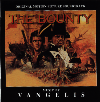
Roger Donaldson directed this third feature film that handled the classic story of the mutiny on an 18th century sailboat. It starred Anthony Hopkins and Mel Gibson. The original score was composed by Vangelis. It was never officially released on an album but the tracks "opening titles" and "closing titles" did show up on the "Themes" compilation album. The end titles were re recorded and arranged a little bit differently.
A bootleg exists (as well as a different CDr, made by fans), in the form of a double album, containing most of the score. The sound quality however is rather bad.
-
Sauvage et Beau (1984)
This is the fourth wildlife film directed by Frederic Rossif which had a score composed and performed by Vangelis. Unlike the other films and series this one never had its score released on an album. A rumor claiming an LP was made and released in Germany but immediately retracted is simply false. In 1996 however the closing titles were released on CD-single and the compilation album "Portraits {So long ago so Clear}".
The American video release of it called "Savage and Beautiful" claims to last (only) about an hour, but this is an error, the tape lasts the full length of the French film totalling to almost an hour and a half.
-
Missing (1982)

Constantin Costa-Gavras' impressive and realistic melodrama "Missing" tells the true story of the frantic search for a left winged reporter in a South American country by his wife (Sissy Spacek) and stubborn father (Jack Lemmon). Vangelis wrote a simple score for it, based on a rather effective theme.
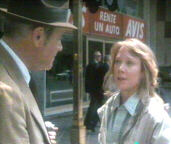
A soundtrack album was never released. A re-recorded version of the main theme can be found on official compilation albums "Themes" (1989) and "Odyssey" (2003).
-
Crime And Passion (aka "Ace Up My Sleeve") (1975)
Film directed by Ivan Passer starring Omar Sharif and Karen Black. Vangelis scored this film in his typical style from the mid seventies. Think of the sweeter parts of albums like "La Fete Sauvage" and "Ignacio". Particularly noticeable are two French style love themes which reappear in the film. Most music is quite mysterious but there are also some tense and bombastic parts. It's a shame that none of the music was never released outside of the film
Unfortunately there are two versions of this film, one with Vangelis' original score and one with music by another composer. The US version of the "Crime and Passion" videotape for instance does NOT have Vangelis music. However the Japanese version (English sound, Japanese subtitles) does, and the German "Ace Up My Sleeve" also does..
Amore (1973)
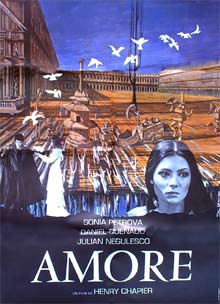
Another movie scored by Vangelis, that seems to have been lost in time. It was French director Henry Chapier's second movie. His first was the famous "Sex Power", which also featured an original score by Vangelis. Unlike Sex Power, Amore's music score was never released. Despite the fact Chapier went on to become a famous journalist and television persona, and some of his early movies featured some well known stars, his films.
For decades Amore was impossible to get a hold of, that is until recently when the French archive institute ina.fr made all of Chapier films available for download.
5000 Lies (5000 Psimmata) (1967)
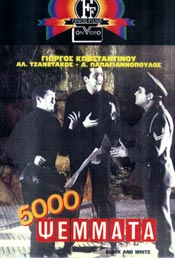
Long before Vangelis went solo, a little after the Forminx fell apart and before Aphrodite's Child was founded, Vangelis composed the musical score for this Greek goofball situation comedy. The music was never released. Filmed in black and white, the movie follows the misadventures of its 3 leading characters getting in trouble as much as possible.
The music, for a 1967 movie, was surprisingly avant garde, adding strange and sometimes unearthly sound effects to the more predictable comedic cues. Outside of the experimental sounds the music reminds of the Forminx and Vangelis' other mid sixties Greek pop music, adjusted more to its instrumental background purpose, and more keyboard oriented.
Needless to say a soundtrack album was never released. But the movie is still widely available in Greek video rental shops.
Special releases
-
Book with VHS: Microneurosurgery With Video Tapes
(aka: The Tegos Tapes) (1998)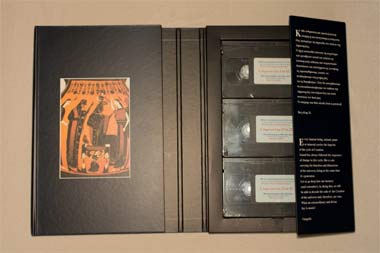
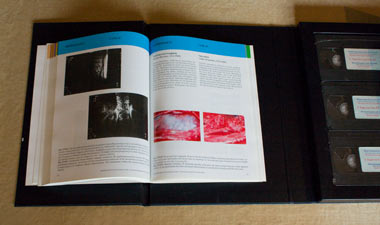
Vangelis composed special music to accompany video recordings included in the medical book "Microsurgery With Video Tapes", published in 1998. The video tapes capture 35 microneurosurgical cases that, together with the book, intend to provide training for people active in this field.
The author of the book, Dr. Stergios Tegos is a good friend of Vangelis. He explains in the introduction of the book that he had the pleasure over the years to learn the neurophysiological processes of Vangelis' musical creativity and the methods by which he creates music. Dr Tegos reveales he had asked Vangelis for two favours. The first was to allow him to obtain a magnetic resonance image of Vangelis' brain. The second was for Vangelis to compose music to accompany the video recordings for his book. Vangelis fulfilled the second request.
The 35 cases are spread over three VHS video tapes. Each tape contains approximately 4 hours of material, resulting in almost 12 hours of video, with a stunning 12 hours of new Vangelis music. All of it unique, none of it repeated, or ever heard before. A new Vangelis composition layed out under every case.
The 3 tapes as well as the pages of the book are constructed in a lavish case, designed to resemble a large book, perfectly fitting next to other books on a book shelve. The textbook attached to the case describing each of the 35 test cases in English as well as Greek languages, plus introductory texts that include a brief on Vangelis, written by Dr. Tegos and a foreword by Vangelis on the project.
The audio format of the video tapes includes a high quality, hifi stereo track, allowing the music to plays at the full frequency-range and in stereo. There is one downside for fans of the music: Dr. Tegos occasionally narates his work, adding voice overs that slightly overbear the music at times. While the narration takes place at key moments during the video, most of the video content is streamed with long and undisturbed music.
The style of the music is quite unlike Vangelis' well known works. The music does not indulge in melodies or swell up into the big emotional phrases Vangelis is so famous for. It's a more sedate style, distinctly electronic in character, clearly intended as a backdrop and not to overpower the visuals or the training. The feeling throughout is pleasant, reflective and relaxing, quite richly arranged with electronic sounds.
Vangelis' work for this medical release was long rumoured among fans, but availability remained a mystery until it was discovered that the box is commercially available as specialized medical literature. The book can be obtained exclusively from a Greek dealer. Either by buying it at their store in Athens, or indeed, by ordering on-line from their web site:
Vangelis fans commonly refer to this item and its music as "The Tegos Tapes".
Ballet music
-
Ballet: the Beauty and the Beast (1986)
Vangelis' third score for a Wayne Eagling cheographed ballet. Performed by the Royal Ballet at Covent Garden in London. Vangelis music was said to be melodic, Tschaikovski-like, with mostly romantic flavors. The music was composed during Vangelis' stay in Los Angelos, while Eagling was working on the ballet in London. The two discussed the proceedings over the phone across the Atlantic.

Eaglings version of the ballet was based on Perrault version of the traditional fairy tale and influenced by a 1949 movie called "La Belle et la Bette". The story of the ballet was split in 7 scenes: "The Beast's Castle", "The Garden of the Castle", "Inside the castle", "Beauty's Bedroom in the castle", "The Banquet Hall of the Castle", "Inside the Castle" and the "Finale".
The performance featured dancers Maria Almeida / Lesley Collier (Beauty) and Jonathan Cope / Anthony Dowell (the Beast) with art design by Jan Pienkowski and lighting by John B. Read. It premiered December 2, 1986.
Watch two movies from news items about the ballet. You can download the files (G2 Realmedia) by using the right mouse button on the link.
batb_1.rm; 1 MB, 0:48.
batb_3.rm; 1.6 MB, 0:24. -
Ballet: Frankenstein - Modern Prometheus (1985)
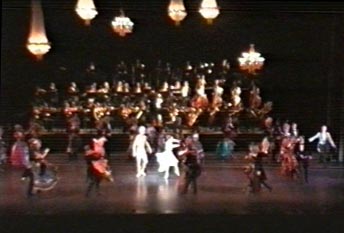
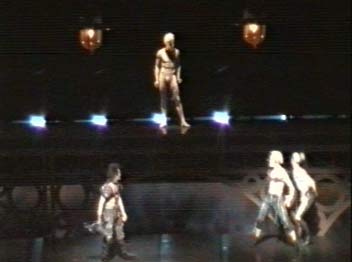
Vangelis wrote the music for this ballet. It was cheographed by Wayne Eagling and first performed by the Royal Ballet on July 26, 1985 at Covent Garden, London. Eagling went on to become artistic director of the Royal Dutch ballet in Amsterdam, where this show was re staged in 1993 (as of June 17) and between March 24 and April 9 of the year 2000.
The ballet lasts about 35 minutes, and mainly features recordings of Vangelis' music. There is however a part where the stage transforms into a ballroom, during which some swirling Vienna styled waltz music is played live by an orchestra. The orchestra returns for a few short moments during the encore, when the main dancers and extras are presented again to receive their applause (or ovation mostly).
The music combines styles from albums like "Soil Festivities", "Mask" and "Antarctica". It is mostly very melodic, with bombastic as well as extremely tender moments. Highlights include the overture (in the dark with a closed curtain), the hypnotic prolonged feeling of wonder when Frankenstein is brought to live, the waltz, and the slow dramatic ending of blowing wind sounds and lonely bells.
Two movie excerpts can be viewed (downloadable G2 Realmedia files) from the ballet:
The monster comes to life; 2MB, 2:19.
The bride has died; 1MB, 0:52.
To download please use the right mouse button or hold shift when clicking.
-
Ballet: R.B. Sque (1983)
Pronounced: "Arabesque". Vangelis' first score for a ballet by Wayne Eagling. It was originally performed by Lesley Colier and Wayne Eagling himself at an Amnesty international gala in Drury Lane, but in 1984 the Royal Ballet School presented it again at the Sadler's Wells theater.
Theatre play music
-
Chariots of Fire play (2012)
A theatrical adaptation of the "Chariots of Fire" film, featuring both new Vangelis music and well known pieces taken from the film score.
The play premiered at London's Hampstead Theatre. After this successful run the play transferred to London's West End where it is still being performed at the Gielgud Theatre. It will continue at least until November 2012.
Our review of the play:
 Chariots of Fire play
Chariots of Fire play
-
Antigone (2005)
Irene Papas directed Sophocles's "Antigone" that was held at the ancient Greek theatre in Syracuse, Sicily. Vangelis provided background and interlude music to go with the play, as well the finale theme music.
-
Le Troiane Ed Ecuba (2003)
Irene Papas directed her second series of Greek tragedies "Ecuba", this time performed at the Tor Vergata university campus in Rome. Vangelis again provided new music for play.
-
A Vihar (The Tempest) (2002)
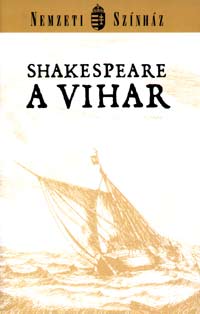
Director György Schwajda staged Shakespeare's "The Tempest" to open the new Hungarian National Theater. Using the theater's remarkable technical stage, with light and sound effects, Vangelis' passionate and melodic music completes the spectacle.
Read all the details in our feature article, including an interview with the play's stage director, on:
 A Vihar
A Vihar -
Las Troyanas (2001)
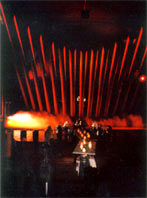
Irene Papas' play performed in Sagunto (and to be performed in Rome and Athens in the future) was blessed with a minimal but effectively arty score by Vangelis, making use also from local traditional cantata (somewhat comparable to Gregorian singing).
Samuel Gomez witnessed one of the performances of the spectacle and wrote a report.
-
Medea (Euripides) (1992)

Vangelis wrote the music for this intense dramatic performance starring Irene Papas, Carlos Lucena, Manuel de Blas, Jordi Dauder and Miquel Cors. Director Nuria Espert is considered to be one of the best theater actresses and directors in Spain. The play was staged in Barcelona during July 1992 and was produced by the Olympic Festival of Arts. The sounds design was by Denis Vanzetto who also worked various Vangelis albums.
The photo of Papas in the "Related artists" section of this site shows Papas performing in "Medea".
The music was very minimalistic, comparable with the music of "Night of Poetry" and its seriousness can be compared to "Foros Timis Ston Greco" and the quite parts of "Rapsodies". It consisted never of more than a few sounds and tones expressing the drama. The image to the right shows the program for the show.
-
Elektra (1983)
In 1983 Vangelis wrote the music for Michael Cacoyannis' staging of the Greek tragedy Elektra which was performed featuring Irene Papas at the open-air amphitheater at Epidavros in Greece. The music was never released on album.
Music from televised and radio interviews
-
Music in TV-Interview: Musiques au Coeur (1992)
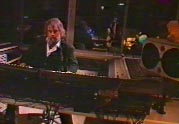
"I am like a shop..." Vangelis replies in French, smiling to his female interviewer, when she asks him to demonstrate yet another sound. This remarkable program totally dedicated to Vangelis was recorded and broadcast in 1992 by the French television station France 2. It was later broadcast by the more internationally operating TV5.
Vangelis is being interviewed in his "Epsilon" studio, sitting behind his synthesizer setup, gently answering the questions and demonstrating things on his synths. This is probably the most interesting aspect of it. Vangelis improvises a string of beautiful pieces. One gentle and soft, the next bombastic and haunting. With a set of keyboards and a lineup of foot pedals within his reach he gives away a rare glimpse of the remarkable techniques he uses to compose, perform and record his music.
Also shown are excerpts from films such as Blade Runner and La Fete Sauvage (some highlights with the wrong music mixed over it) and, more interestingly from performances like "Antigone". Also a clip shows Vangelis and Philippe Colonna presenting music for 1492 to Ridley Scott (director) and Gerard Depardieu (lead actor).
You can download a short video clip in MPEG1 format of Vangelis playing. aucoeur.mpg (2069KB, 51sec, 176 x 144)
-
Music in TV interview: on Greek channel ET1 (1990)
Shortly after Vangelis' "Song for Athens" concert in 1990 to promote the nomination of Athens for the Olympic games of 1996 (which were held in Atlanta instead), Vangelis gave an interview in Greek for the Greek public TV station AT1. He also ad-libbed quite a lot of unreleased music in front of the eye of the camera, which the director of the show inter cut with various landscape images. The music is beautiful, but the program, mainly due to bad direction and editing can't quite impress as much as the French "Musiques Au Coeur" show did two years later.

You can download a short video clip in MPEG1 format of Vangelis playing. et1.mpg (2069KB, 46 sec, 176 x 144)
-
Olympic promotion animation (1990 or around)
Around 1990 Vangelis composed the "score" for an animation that was created to promote Athens' candidacy to host the 1996 Olympic games. The animation features ancient Greeks who, thanks to the spirit of the Olympics, stumble upon a television that lets them catch a glimpse of the future of Greece, at which point archive footage is inserted of important cultural and sport events that took place in Athens' more recent history. The music was composed in quite a romantic "Direct" style, featuring Vangelis' usual Olympic styled orchestra sound, also with some electronic sounds. The animation features no dialogs and it sounds like Vangelis also made the sound effects so it almost works like a 10 minute music video.
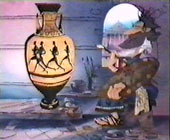
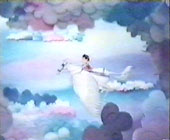
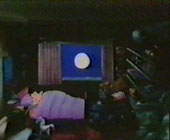
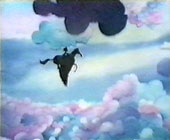
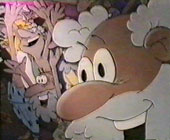
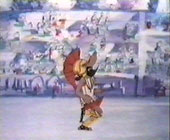
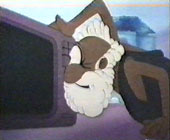
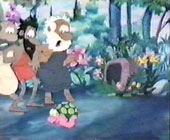
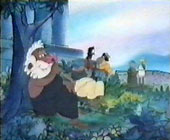
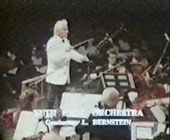
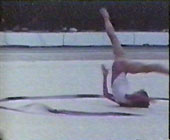
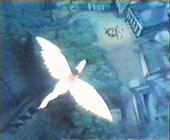
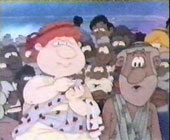
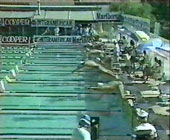
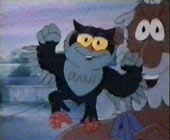
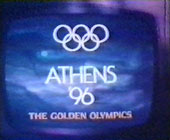
-
TV event: Sport Aid - The Race Against Time (1986)
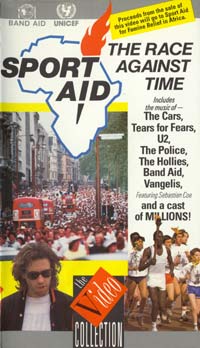
About a year after Bob Geldof organized the massive "Live Aid" charity event, he set up another campaign to raise money for starving Africans in poor countries. This time the idea was to have a sponsored 10 km run, simultaneous across the world. They set out to get one million people running in 70 cities. But May 25 1986 turned out to set the record as the biggest mass participation event ever, having twenty two million people on the move in 274 cities / 87 countries.
The event was promoted by spots cunningly synchronized to an edit of Vangelis' Pulstar track. But Vangelis composed three new compositions for the event itself. One theme to accompany the lighting of the flame, a main theme for the event, and a more than 10 minutes long background tune that was used in broadcasts throughout the world. The idea of the event was revisited in 1988 and 1990, but in both instances less successfully and without original Vangelis music.
A videotape to raise more money for the cause was released in the UK shortly after the event. It contained a documentary about the event, including the flame and main theme but in minimal quality, mixed in with documentary material with some extra voice over and interviews. The background theme appeared briefly in a montage of footage, but the music was cut up along with the images. The VHS was only sold for a short period and was not reprinted.
View a video fragment using Vangelis' flame and main themes: (5:41, 3.4MB, 176x144, Realvideo 8, 80Kbps)
Download (use "save as"): sportaid.rm
-
TV Interview: Electric Theater Show:
"Vangelis, the Man" / "The Man and his Music" (1984)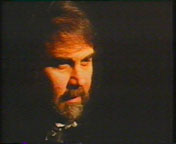
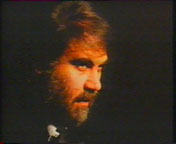
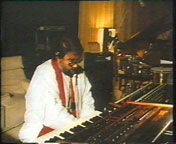
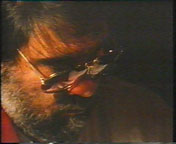

The most well known of these two is "The Man and his Music", a TV show of almost 25 minutes features an interview inside Vangelis' Nemo studio, displaying unique views on the recording environment and scenes with Vangelis playing and demonstrating his musical instruments setup. These remarkable recordings are comparable to the famous but more static scenes in the French "Musiques Au Coeur" interview almost a decade later in 1992.
Vangelis seems completely relaxed while playing, improvising on different sounds, playing the CS80, his Emulator sampler, and many other synths, giving a unique insight on his recording techniques at the time.
You can download a short movie in MPEG1 format of Vangelis speaking and demonstrating his gear (Yamaha CS80 on his right and an Emulator in his front). vtmahism.mpg (2405KB, 70sec, 176 x 144)
The program is actually the second in a series of two. The first, broadcast two weeks earlier was called "Vangelis, the Man" and mostly featured Vangelis' collaborators talking about working with Vangelis. This includes Frederic Rossif over the phone, Hugh Hudon about discovering Vangelis' musical power while editing a low budget documentary to "To The Unknown Man", Wayne Eagling and a dancer about working on their "RB Sque" ballet, etc. It also featured footage of Vangelis improvising some new music, just like the "Man and his Music" episode, but a different part of these sessions.
-
TV Performance at Musical Express (1981)
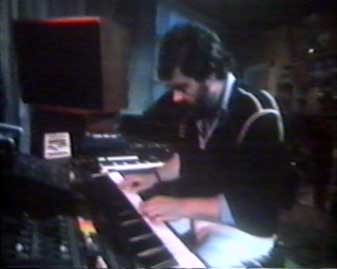
The Spanish TV show "Musical Express" did a series on electronic music and featured Vangelis. He was interviewed and improvised a track together with the two musicians who formed "Neuronium" at that moment. This track was later edited into the CD single "In London" by Michel Huygen of Neuronium. Vangelis however also performed a track all by himself, using a lot of arpeggiators and sequencers. It sounds a bit like an unpolished "Spiral" variation.
You can download a short video clip in MPEG1 format of Vangelis playing. mexpr.mpg (2147KB, 73sec, 176 x 144)
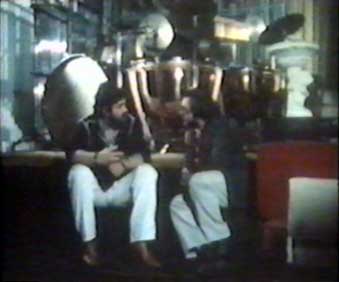
Less well known is that there is more Vangelis' music in this show. When the presenter is in Berlin, speaking about the likes of Tangerine Dream and Klaus Schulze, the music in the background is clearly Vangelis' improvising work, with all the familiar CS80 sounds and production techniques evident.
Also notable is that in the Musical Express show that preceded this one the "In London" bit was previewed, showing a part that was not in the actual broadcast, nor on the In London single.
-
Music in radio interview: Walhalla (1981)
The Dutch radio show "Walhalla" visited Vangelis Nemo studios for an interview. Vangelis demonstrates many facets of his studio. He mainly plays with weird sound effects and atonal sounds but the occasional melody pops up, and although you could hardly call this another "work", it's most certainly very interesting to hear those familiar sounds in their rough forms and audibly witness a nice demonstration of the instruments that was set up at the time.
-
Music in TV-interview: L'Arbre de Vie (1981)
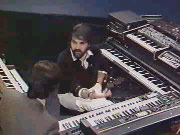
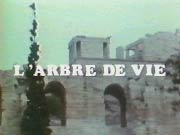
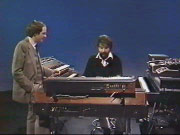
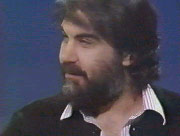
This program was a concept proposed by Frederic Rossif, a 50 minute special about Vangelis in the shape of a French interview held at a television studio hired in London for this film recording. The program Vangelis is seen improvising (instantly composing) new music, in his "Rossif style". It contains, in that sense unreleased music. Vangelis plays various pieces in different styles, including romantic electronic pianos and the expressive experimental percussion. Furthermore there are excerpts from wildlife films or series such as "La Fete Sauvage" and "Opera Sauvage", with music not featured on the soundtrack-albums.
Music for Exhibitions
-
Painting exhibition Valencia (2003)
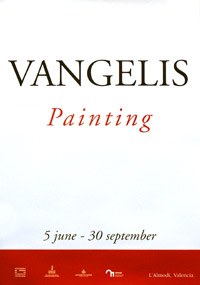
Music of course was not the focus of attention of this event, but the fact that Vangelis recorded a background to his first ever exhibition in the art of painting does provide a nice angle to categorize some info on Vangelis' paintings in this music oriented web site.
Every day that the Almudin building opened its doors for people to see Vangelis' paintings, a soft soundscape of subtle ambient music was played on the PA system, in an infinite loop. The lenght of the "loop" is debated, since the music was so subtle, it was hard to recognize its slow changes and even harder to pinpoint where you hear it repeat from before. Most say it was longer than 30 minutes and no longer than 80. Quite possible.
The music was definately intended as a background, in that it's synthesizer tones were not melodic. It wasn't however as abstract as Invisible Connections or Beaubourg. In fact, it was quite tonal, even harmonic, just simply to slow to call it melodic.
Read more information about the Valencia exhibition on:
 Vangelis Painting exhibition.
Vangelis Painting exhibition. Following the Valencia display, the paintings made a tour through several south American countries, where they were displayed in cities like Montevideo, Buenos Aires, Salvador de Bahia, Sao Paulo, Belo Horizonte and finally Cuba, before they returned to Greece. However, the music described above was only used in Valencia, for which it was specifically composed.
Music for Fashion shows
-
Mary Katrantzou Spring Summer 2020 (2019)
Vangelis composed a complete new score for this unique event at the Temple of Poseidon in Greece. Check out our featured article:
-
Mary Katrantzou Spring Summer 2019 (2018)
For Mary Katrantzou's fashion show at the prestigious London Fashion week, Vangelis selected mostly from his 1980's catalog, reediting his music to fit the show, including a new piece of music that sounds like a piano variation on Pulstar. The music was well received and the show a success.
Furthermore
There were two trailers for 1492 containing original Vangelis pieces that have not seen the light anywhere else. First there was a French teaser, which contained sound effects with a few musical notes, all very recognizably Vangelis. This teaser has appeared, in rather poor quality, on the French DVD of the movie. Second, there was a trailer with a typical 1492 piece with choirs and some Spanish guitars playing a variation on a theme that did end up in the movie. The trailer with this piece appeared on the DVD that is released in most parts of Europe, except France. There were however at the time also trailers that did not feature any Vangelis music, but used existing music from other composers or bands, such as Enigma.
Vangelis composed music for several commercials. He did rearrangements of some of his own famous tunes for Gallo Wine (Hymne) and Ridley Scott's Citroen Xantia (Chariots of Fire), as well as remixing and editing "The Little Fete" from "China" for one of Ridley Scott's "Chanel 5" commercials. He composed original music for David Bailey's anti fur commercial "Dumb Animals", as well as (unconfirmed) Bailey's Etheopia plea for help. Vangelis also added sound effects and a few synth parts to a classical performance of Mozart's "The Marriage of Figaro" for Hugh Hudson's Fiat Strada commercial called "Handbuilt by Robots". There must be many more commercials for which Vangelis composed or rerecorded music.
The emblem for the Olympic Games to be held in Athens in 2004 was presented in a small film for which Vangelis composed the dominant soundtrack. The music (as well as the film that presented it) was in the style of the Athens 1997 athletic championship opening Ceremony that Vangelis directed, composed and performed on. It was shown at a presentation that was broadcast live on Greek television in 2000. Later in the same year the Olympic flame was sent out from Athens to Sidney for the Games of that year, in a ceremony that again featured new music by Vangelis, this time in the background. It was broadcast on Greek TV and featured in sports programs over the world.
Besides making music Vangelis also paints and sculpts. In 2003 Vangelis allowed for a collection of his paintings to be exhibited at art galleries around the world. At the galleries there was a hidden sound installation that played abstract music made by Vangelis. The music played very faintly and was abstract with no melodies, it was not too dissimilar to "Invisible Connections" but without the percussion.
For Jacques Cousteau Vangelis wrote music including the recognizable uplifting theme (not having a formal name, sometimes labeled by fans as "We Cannot Permit") that reappears in all Vangelis scored episodes. You can listen to an MP3 file of this: csteau.zip (136KB, 24Kb/s, 22Khz mono, 49 sec, zipped for technical reasons). Vangelis' publisher at some time listed the following Cousteau films to be scored by Vangelis:
- Streams Of Life
- Indonesie I, Les Vergers de L'Enfer (1991)
- Indonesie II, Sumatra (1991)
- Mirage Of The Sea
- Rio 92
- La Mer Volee
Rio '92 seems to refer to the famous Earth Summit held in Rio De Janeiro, for which Cousteau famously made a special documentary, leaving an impression on the participants. Both Indonesia episodes as well as "Mirage of the Sea" are confirmed, the rest of the titles remain mysteries.
The main theme for BBC's "Great River Journeys" was written by Vangelis and also never released. It's a short piece that sounds a bit like the middle between "Sauvage et Beau" and his more modern style with pop percussion.
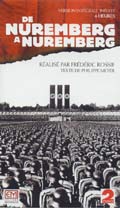
"De Nuremberg a Nuremberg" (1988) is a documentary in two or four parts (depending on the version you encounter) directed by Frederic Rossif, delving into the heavy subject matter of the 2nd world war and Nazi Germany. Vangelis composed an intense and dramatic musical score. Most pieces of music that can be heard are very short but effective. The opening titles are bombastic and scary in this context.
Although the series starts cold and politically, it builds up to boldly display the terrible and unrelenting truth of the nazis' worst actions. The music holds the parts together and completes the picture. The releases and broadcasts were not the same, in every different country. The original version seems to have had a duration of 3 hours, being broadcast on TV in France, Germany, etc. But later on, the production was also broadcast and released in France, as an impressive 4 hour version, referred to as the "Version integrale inedit".
"Pasteur le Siecle" (1987), yet another Rossif film, this time focusing on a famous French medical laboratory located in Paris, "L'institut Pasteur". It features a completely new Vangelis score, unusually electronic when compared to the other Rossif scores, featuring a sound and style that reminds of the energetic but at the same time lush electronic Direct album from the same year. Lots of sequences but also orchestral percussion.
Frederic Rossif made a documentary called "Les Trente Soleils" (1981) for which Vangelis supposedly wrote the score. I have no additional info (can anyone properly confirm this?).
Some of Rossif's nature series were recompiled into new films or series and broadcast on television or sold on VHS cassettes.. These include "Splendeur Sauvage" (series of about 30 episodes of 25 minutes each, parts from Apocalypse, Fete, Opera Sauvage an Sauvage et Beau"), Les Animaux des Frederic Rossif (6 episodes of over an hour on VHS tapes), "Beaute Sauvage" (Series of VHS tapes). Some of these recompilations do seem to contain pieces of music or perhaps pieces from the series that are not found in (certain versions of???) the original series or films.
Vangelis recorded the music for a number of Rossif films about the world's famous modern painters. The first of the series, "George Mathieu ou la Fureur d'Etre" (1971). Until recently, the film was one of the rarest items to find as it has never been released on VHS or any other home movie medium. In 2002 the film however was re-mastered by a French institute for high quality preservation, and was once screened in a Paris cinema. This remastered version of the film was finally released on DVD with English subtitles. Special about this particular film is that Vangelis appears in it himself. Vangelis can be seen improvising music while Mathieu works on one of his paintings, an ensemble work also including an improvisational dancer, setup especially for this movie.
The second of these movies, "George Braques Ou Les Temps Different" (1974, about 90 minutes) contains some music appearing earlier in the Mathieu film, along with new material, including some rather abstract piano hammering, a haunting melancholic synthesizer theme, a ragtime period tune, and a small part where Vangelis hums a melody as if he were in a shower.
The third of these movies is "Pablo Picasso, pientre" (1982), which was both televised and released on video in at least Japan. The music sounds appropriately abstract. It features fragments of the melody of "Horizon" (J&V Private Collection) and a lot of "Beaubourg" sounds. Also a lot of source music is included to draw a musical painting of the time period of the subject.
All of these films cleverly combine the historical and political context of the periods the painters lived in, with an overview of work and lives of these legendary artists.
A fourth Rossif movie in a similar style with a Vangelis score, about painter "Morandi" is often dated as 1989, although it looks and sounds as if it was made much earlier, in the seventies, as the other painter movies were. Both the George Braques and Pablo Picasso films remains unreleased on film.
Frederic Rossif's "Cantique des Creatures" should be an early Rossif film on which very little is known. Note that it is not a series of movies, a common misconception lists Mathieu, Braques and Picasso as parts of this series, but that is not correct, the Cantiques des Creatures was a separate outing, although some of these later films indeed use short cuts from the original Cantiques des Creatures film.
"Au Pays des Visages" (1972) was probably the first cooperation between French documentary film maker Frederic Rossif and Vangelis as score composer. This art documentary with a duration of about 45 minutes mostly contains very short snippets of music used to bridge the monologues of various chapters, and sometimes ads a rather abstract dark feeling to the narration. The music varies from abstract loose rumbling sounds to well developed passages including choirs, flutes and layers of Vangelis' keyboard performances. The end titles in particular contain a melodic piece reminiscent of sounds from "Apocalypse des Animaux" (Rossif series) or "Fais Que Ton Reve Soit Plus Long Que La Nuit"(album). Some of this music re-appeared across various Rossif productions, including the "Apocalypse des Animaux" series, which makes it hard to determine which music was written for which production specifically.
Tracks that were never officially released

There are also various songs/albums that were never officially released. There are two known completed albums: one called "Inner Data" (1987), the other called "Symphony nr 3" (1990). Both were announced and later withdrawn. No one ever seems to have heard them. Vangelis mentioned Symphony nr3 in his July 1990 interview in the magazine Sound on Sound.
Furthermore the book "Vangelis - the Unknown Man" (Mark J.T. Griffin) reports of a concept album that portrayed the horrors of the Gulf war, called "Arab", which never made it to a release.
Then there are two tracks from "See You Later" (1980) that were on an early test print in the UK, which ended up in the hands of a fan. Although no titles where provided at the time, quite coincidently the Irish pressing of "See You Later" had its labels incorrectly printed using the discarded tracklist, inadvertently revealing the two respective track titles. "Fertilization" (often refereed to as "Gestation") is a long track about human gestation, featuring cold voice-overs stating clinical facts about human conception and describing the process of birth over nicely building and growing music, climaxing into a blast, followed by soft and slow piano music. You can download a sound excerpt, gest.zip (MP3, zipped for server reasons, 458K). Beware: it contains some explicit language.
"Neighbors Above" begins sounding like retro dance music; A a sequence with a resonant filter sweeping across the bars. Then it changes to some silly old fashioned "party" music with vocals singing "We are your neighbors" in chorus.
The initial version of Jon and Vangelis' "Page Of Life" was distributed on a promo cassette before certain pieces got replaced. Jon Anderson for long claimed he would release this version someday. This became the version of Page of Life as released by Higher Octave music in the US. It is however not the early edit which leaked, so there are still some cues which can only he heard as copy of the legendary promotape.
A tape has somehow surfaced with five demosongs by Jon and Vangelis ("Let's Pretend", "All Through the Night", "Say What You Will", "The Arms of Love" and "Distant Thunder"), recorded somewhere between the "Private Collection" album (1983) and "Page Of Live" (1991). You can download a short excerpt of this in the MP3 format: letspret.zip (257KB, 52 sec, 40Kbps, 22Khz stereo, zipped for technical reasons). This demorecording was later rewritten and performed by the Anderson/Bruford/Wakeman/Howe combination as "Let's Pretend", which can be found on their selftitled album. There is a bootleg which has four of the 5 songs in excellent sound quality, but accidentally replaced "Let's Pretend" by some unrelated instrumental tune.


